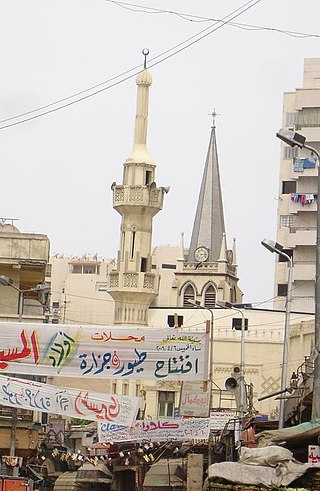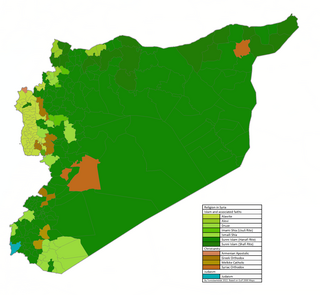| Total population | |
|---|---|
| 1,110 (2013) [1] | |
| Regions with significant populations | |
| Auckland | |
| Languages | |
| New Zealand English, Egyptian Arabic, Coptic, Nobiin, Sa'idi Arabic | |
| Religion | |
| Majority: Christianity (Coptic Orthodox), Minorities: Islam (Sunni), Baháʼí, Judaism. | |
| Related ethnic groups | |
| Egyptians, Egyptian diaspora, Arab New Zealanders, Egyptian Australians, Egyptian Americans, Egyptian Canadians, Egyptian British |
Egyptian New Zealanders are New Zealand citizens and New Zealand permanent residents of Egyptian descent. According to the New Zealand 2013 Census, 1,110 New Zealand citizens and permanent residents declared that they were of Egyptian descent. [1] [ dead link ]
The majority of Egyptian New Zealanders are Christians, predominantly Coptic Christianity, which is in contrast to the religious affiliation to Islam of the majority of the population of ethnic Egyptians within modern Egypt. Centuries of a steady continuous rate of conversions of the local indigenous Egyptian population has resulted in modern Egypt's Muslim majority, although the indigenous Christian Church of Egypt has retained a sizeable minority throughout its history, up until today. Christians comprise much of the Egyptian diaspora, both in New Zealand and elsewhere.
Some New Zealand citizens and residents declared membership of the Coptic Orthodox Church. Most Egyptian Christians, however, may simply have declared themselves "Christian" without specifying the Coptic denomination, while other Egyptian Christians may belong to various other denominations, either born into or converted.
Emigration from Egypt was significant in the late 1940s and 1950s, disproportionately so for non-Muslim religious minorities escaping the growing Arab nationalist movement in Egypt which saw the overthrow of the Egyptian monarchy and the subsequent Suez Crisis. [2]
In total numbers, Egyptian Christians were the largest contingent of emigrants to leave Egypt for other countries, including to New Zealand. Christians were the second largest in terms of proportion to their original community size in Egypt. Egyptian Jews, as a proportion of their original community size in Egypt, were the largest emigrant community to leave Egypt (they were the second largest in total numbers). The number of Jews in Egypt numbered around 75,000 in 1948, and following the establishment of the State of Israel that same year, almost the entire population left in the subsequent years during the Jewish exodus from Arab lands, settling largely in Israel, United States, Europe, Latin America, as well as Australia and New Zealand. Officially, only 6 Jews remain in Egypt today. [3]

This is a demography of the population of Lebanon including population density, education level, health of the populace, economic status, religious affiliations and other aspects of the population.

Copts are a Christian ethnoreligious group indigenous to North Africa who have primarily inhabited the area of modern Egypt since antiquity. They are the largest Christian denomination in Egypt and the Middle East, as well as in Sudan and Libya. Copts in Egypt account for roughly 5–15 percent of the Egyptian population; Copts in Sudan account for 1 percent of the Sudanese population, while Copts in Libya similarly account for 1 percent of the Libyan population.

Arab Christians are ethnic Arabs, Arab nationals, or Arabic speakers who follow Christianity. The number of Arab Christians who live in the Middle East was estimated in 2012 to be between 10 and 15 million. Arab Christian communities can be found throughout the Arab world, but are concentrated in the Eastern Mediterranean region of the Levant and Egypt, with smaller communities present throughout the Arabian Peninsula and North Africa.

The phenomenon of large-scale migration of Christians is the main reason why Christians' share of the population has been declining in many countries. Many Muslim countries have witnessed disproportionately high emigration rates among their Christian minorities for several generations. Today, most Middle Eastern people in the United States are Christians, and the majority of Arabs living outside the Arab World are Arab Christians.
Egyptian Americans are Americans of partial or full Egyptian ancestry. The 2016 US Census estimated the number of people with Egyptian ancestry at 256,000, most of whom are from Egypt's Christian Orthodox Coptic minority. Egyptian Americans may also include the Egyptian foreign-born population in the United States. The US Census Bureau estimated in 2016 that there were 181,677 foreign-born Egyptians in the United States. They represented around 0.4% of the total US foreign-born population as 42,194,354 first-generation immigrants in 2016. Egyptians are concentrated in New York City and Los Angeles. California has the largest Egyptian population by state.

Religion in Egypt controls many aspects of social life and is endorsed by law. The state religion of Egypt is Islam, although estimates vary greatly in the absence of official statistics. Since the 2006 census religion has been excluded, and thus available statistics are estimates made by religious and non-governmental agencies. The country is majority Sunni Muslim, with the next largest religious group being Coptic Orthodox Christians. The exact numbers are subject to controversy, with Christians alleging that they have been systemically under-counted in existing censuses.

Christianity is the second largest religion in Egypt. The vast majority of Egyptian Christians are Copts. As of 2019, Copts in Egypt make up approximately 10 percent of the nation's population, with an estimated population of 9.5 million or 10 million. In 2018, approximately 90% of Egyptian Christians were Coptic Orthodox.

Egyptian Australians are Australian citizens and Australian permanent residents of Egyptian descent. According to the Australian 2011 Census, 36,532 Australian citizens and permanent residents declared that they were born in Egypt, while based on the 2006 Census, at least an additional 31,786 declared that they were of full or partial Egyptian ancestry and born in a country other than Egypt. The 2021 Census shows that the majority of Egypt-born Australians are located in Sydney (19,680) and Melbourne (13,312).

The Arab world consists of 22 states. As of 2021, the combined population of all the Arab states was around 475
For approximately a millennium, the Abrahamic religions have been predominant throughout all of the Middle East. The Abrahamic tradition itself and the three best-known Abrahamic religions originate from the Middle East: Judaism and Christianity emerged in the Levant in the 6th century BCE and the 1st century CE, respectively, while Islam emerged in Arabia in the 7th century CE.

Christianity, which originated in the Middle East during the 1st century AD, is a significant minority religion within the region, characterized by the diversity of its beliefs and traditions, compared to Christianity in other parts of the Old World. Christians now make up approximately 5% of the Middle Eastern population, down from 13% in the early 20th century. Cyprus is the only Christian majority country in the Middle East, with Christians forming between 76% and 78% of the country's total population, most of them adhering to Eastern Orthodox Christianity. Lebanon has the second highest proportion of Christians in the Middle East, around 40%, predominantly Maronites. Egypt has the next largest proportion of Christians, at around 10% of its total population. Copts, numbering around 10 million, constitute the single largest Christian community in the Middle East.

Religion in Syria refers to the range of religions practiced by the citizens of Syria. Historically, the region has been a mosaic of diverse faiths with a range of different sects within each of these religious communities.

Islam is the dominant religion in Libya.
Arab Australians refers to Australian citizens or residents with ancestry from the Middle East and North Africa, regardless of their ethnic origins. Many are not ethnically Arab but numerous groups who include Arabs, Kurds, Copts, Assyrians, Berbers and others. The majority are Christian by faith with minorities being Muslim, Druze, Yazidi and other faiths.
The Islamization of Egypt occurred after the 7th century Arab conquest of Egypt, in which the Islamic Rashidun Caliphate seized control of Egypt from the Christian Byzantine Empire. Egypt and other conquered territories in the Middle East underwent a large scale gradual conversion from Christianity to Islam, accompanied by jizya for those who refused to convert. Islam became the dominant faith by the 10th to 12th centuries, and Arabic replaced Coptic as the vernacular language and Greek as the official language.

The Coptic diaspora consists of Copts who live outside of their primary area of residence within parts of present-day Egypt, Libya and Sudan.

The Syro-Lebanese of Egypt, also known as Levantine-Egyptians or Syro-Egyptians, are an ethnic minority group in Egypt. They are Egyptians who have ancestry originating from the Levant, mostly what is now Syria and Lebanon, but also including those from Palestine. The majority of Egypt's historic Syro-Lebanese community is Christian, mainly Greek Orthodox and Eastern Catholic.
Copts in Egypt refers to Coptic Christians born in or residing in Egypt.
Coptic Australians are Australians of Coptic descent or persons of Coptic descent residing in Australia. According to the 2011 census, there were 24,693 Copts in Australia, mostly members of the Coptic Orthodox Church. The Coptic population within Australia is estimated to be between 70,000 and 100,000 people.
Lebanese New Zealanders refers to citizens or permanent residents of New Zealand of Lebanese ancestry. The community is diverse, having a large Christian religious base, being mostly Maronite Catholics and Greek Orthodox, while also having a small Muslim group of both the Shia and Sunni branches of Islam.